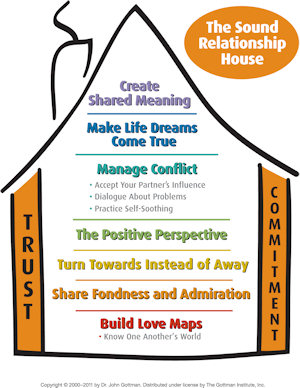Couple's Therapy
Do You And Your Partner Feel Like You’re Just Not On The Same Page Anymore?
It's Hard To See Your Relationship With Fresh Eyes When You’re In It
Sometimes, breaking out of these old patterns requires extra help. And as a therapist who specializes in working with couples, I’m confident that I can empower you and your partner to overcome hardened tendencies and restore your emotional connection. I utilize skills drawn from the Gottman Method as well as solution-focused techniques to help both straight and LGBTQ+ couples create strong foundations together.
Whether you are looking for long-term foundational changes to your relationship or you simply want to address a few specific issues, I am here to help you achieve your goals.
Every Relationship Goes Through Seasons Of Disconnection
After all, the honeymoon phase—no matter how enthralling it is—can’t last forever. Despite what you see on social media, no relationship is all happy vacations and starry-eyed engagement photos. Eventually reality sets in and couples have to figure out how to combine their visions for the future.
Oftentimes, couples start out strong and then fall into a predictable pattern of trying to balance their careers, children, and social lives. Through no fault of their own, they end up too time-starved to prioritize their relationships. Rekindling their lost spark is hard, and sometimes, seeking professional support is the surest way to get it back.
Most People Aren’t Taught To Handle Conflict In A Healthy Way
To one extent or another, we are all influenced by the relationships we grew up with. Many of us end up mimicking what we saw in our parents’ relationships or replaying the patterns in our own past relationships. We do so without even being conscious of it—to us, the way we’ve seen relationships modeled for us is simply the way that relationships are.
Unfortunately, these models often leave us with less-than-healthy strategies for working through conflict. On our own, we tend to default to avoidance, defensiveness, stonewalling, and other unhealthy habits. We try to prove ourselves right, and if we can’t, we disengage altogether. We go to separate rooms, watch our separate shows, and wait till the whole thing blows over.
But the key to having a healthy relationship doesn’t mean avoiding conflict. It means figuring out how to work through conflict constructively, viewing it as a source of growth instead of an opportunity to “win” or “prove ourselves right.”
Therapy Can Help Couples Build Stronger Foundations Together
Essentially, the point of my approach is to help you figure out how not to avoid conflict, because conflict, when approached in a healthy way, builds intimacy and understanding. Think about it: you and your significant other have come this far. You’ve been through the fire together. And by teaching you to learn, listen, and turn toward each other with empathy, you can shore up your relationship so that conflict is a source of growth instead of staleness or defensiveness.
What To Expect In Couples Therapy Sessions
I practice the Gottman Method and Solution-Focused Therapy with couples, which can help you and your significant other understand your individual roles within the collective—in other words, what you bring to the table in terms of communication style, conflict management, intimacy, etc. Then I’ll work with you to identify both the resources you already possess and the tendencies that keep you stuck in negative loops, such as criticism, defensiveness, and stonewalling.
Additionally, there are times when I may utilize mindfulness skills like journaling, meditation, and other self-soothing techniques. This way, you and your significant other can learn to fruitfully engage in tough conversations without getting angry or hostile. You will learn to practice vulnerability with each other, informing the other person of what you truly need instead of blaming them for not providing that. By shifting the focus to your needs instead of the other person’s flaws, you can radically change the way the two of you show up in your relationship.
You May Have Some Questions About Marriage And Couples Counseling…
Isn’t therapy a last resort?
Although therapy can be a last resort for couples who want to save their marriages, it’s best to view it as a new beginning. The old version of your relationship may be gone—and that’s okay. Our mission is to create a stronger, more mature connection in its wake.
What if therapy opens a can of worms and makes everything worse?
Change is uncomfortable. But if you and your partner are looking to change the way you cohabitate with each other, taking the risk to have open and honest conversations is a must. My job is to facilitate those conversations so that they are peaceful and constructive. The more you practice being vulnerable and the more willing you are to confront negative patterns, the easier it is to avoid emotionally-charged arguments.What if we’re not sure that we can afford therapy?
If money is an issue for the two of you, I will help you plan around finances so that therapy does not exceed your budget. Therapy doesn’t have to be long-term—part of my role is equipping you with skills and strategies so that you can navigate relationship problems on your own. In the grand scheme of things, this is a short-term investment with potentially lifelong benefits, a chance to ensure that your relationship stays strong for years to come.Overcome Disconnection And Rekindle Your Spark
If you and your partner have hit some bumps in the road, I encourage you to remember that all is not lost. With my compassionate, solution-focused approach to couples therapy, you can improve upon the strong connection that you’ve built together. To get started, you can call or text me at 425-943-9110 or fill out the contact form to book a free consultation.

